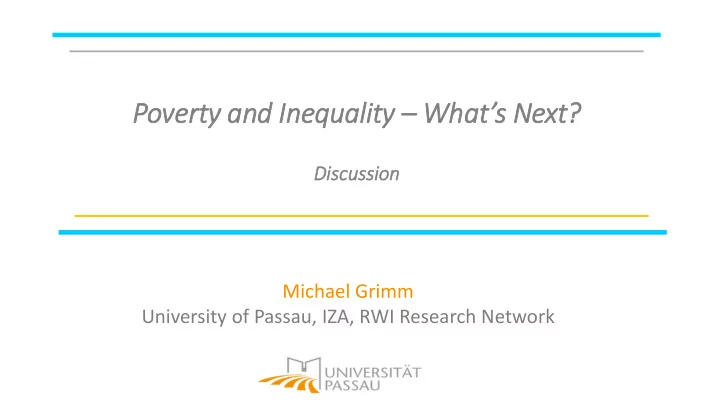

Poverty and In Inequality – What’s Next? Discussio ion Michael Grimm University of Passau, IZA, RWI Research Network
Points to be addressed • Policies to reduce inequalities • Basic Universal Income • The problem with piecemeal approaches • Measurement issues 2
Policies to reduce in inequalities • Reducing poverty while keeping inequality at moderate levels • Equal opportunities, i.e. compensate for neg. circumstances (education, health etc.) • Redistributive policies (social insurance) Have shown to be effective in many circumstances and contexts Challenges: adverse incentives, targeting, financing, political opposition • Pro-poor structural change: Enhance industrialisation to create jobs for the poor and the middle class Advantages: Less prone to political opposition, more sustainable, targeting less of a problem 3
Universal Basic In Income Pro Contra • More inclusive • Takes money away from the poor and gives it to everyone • Less finely targeted • Incentive effects/ use of UBI? • Better incentive effects • Too expensive, financing through • More feasible informationally progressive taxation really • More politically acceptable feasible/plausible? • Financial inclusion • What if growth does not keep up • Women empowerment with inflation? • Prone to political abuse 4
The problem with piecemeal approaches • Leverage on inequality of redistributive policies often weakened due to poor integration of these policies • Example Mexico: social protection of the poor vs. informalisation (see S. Levy) • More generally Latin America: Integration of subsidized social assistance and social insurance system financed largely out of taxes on formal sector employment, is neither efficient, nor equitable (see Ferreira & Robalino, 2010). 5
Measurement is issues • Demographic dynamics: Differential fertility is fueling inequality too. • Missing focus on income mobility: “cross - sectional” measurement of poverty and inequality misses mobility. Persistent inequality in a ‘less mobile’ society requires different policy responses than in a ‘very mobile’ society. • Inequality in wealth including land holdings. 6
Recommend
More recommend